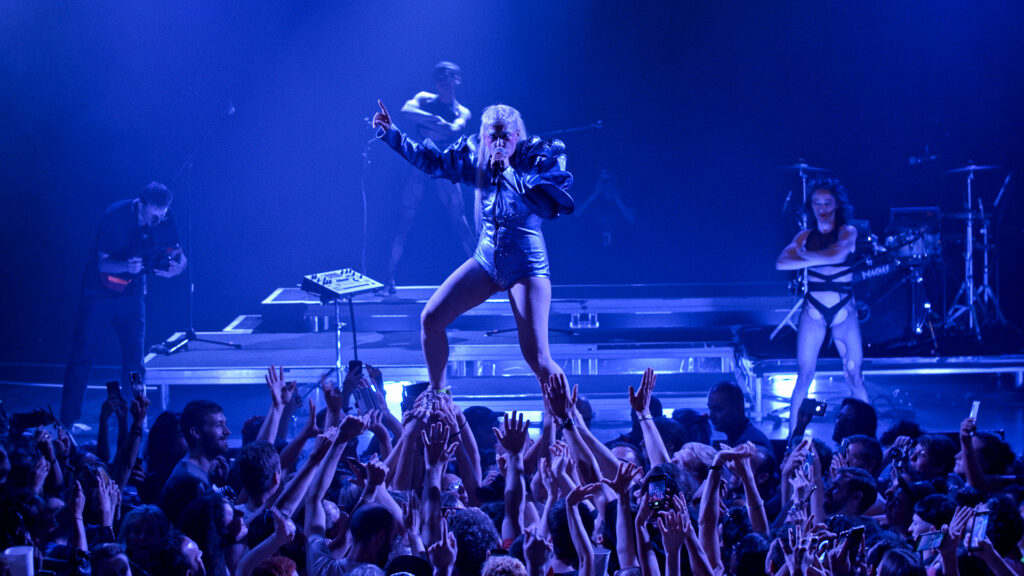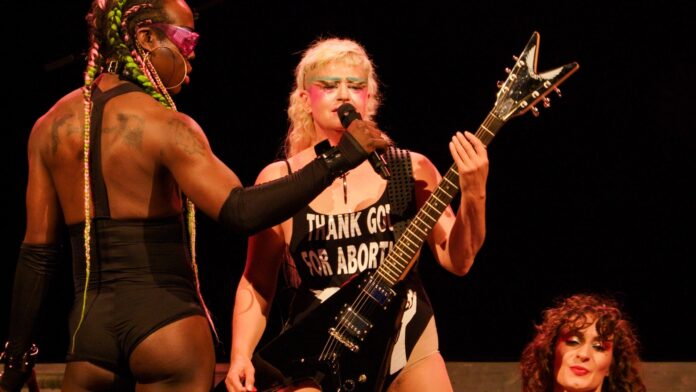Peaches exuded BDE (Big Dix Energy) out of the box.
That’s not to say courage came easy to the electronic artist and queer feminist artivist, famous for her fearless music videos and defiant stage shows, who recently lifted the curtain on her life in a brave new documentary entitled Teaches of Peaches.
Sometimes, she says, standing up for herself can be the absolute pits.
“I don’t think I’m very good at it,” says Peaches. “I don’t think anybody is. More things come up, and it gets difficult. I’m glad you think it looks easy.”
This weekend, she’ll certainly hold her own among a stellar lineup of 60 electronic artists—including Rüfüs Du Sol, Four Tet, Jamie XX, Justice, Disclosure, and M.I.A.—set to take the stage at this year’s Portola Music Festival (Pier 80; Sat/28-Sun/29). She’ll also appear at an official Portola pre-party Boiler Room session with Tove Lo and SG Lewis (SVN West; Fri/27). And, for those who prefer their Peaches XXX-tra hot, she’s at the Regency Ballroom Sat/28 for a Hard x Gay pre-Folsom Fair affair.
Performing in musicals opposite future Barenaked Ladies singer Steven Page or as part of folk trio Mermaid Cafe early in her career, Toronto-born Merrill Nisker already had the seed of Peaches in her.
“I’m sure I did,” she says. “I had a lot of unanswered questions about the way the world was on the outside and what you can and can’t do creatively and artistically.”
A cancer scare and a heavy breakup contributed to the restructuring of her life and identity.
“By the time I got to Peaches, it wasn’t that I needed permission,” says Peaches. “I didn’t make this persona. It kind of evolved. And also, the beginning of Peaches was confrontational. But seeing how the audience reacted, I became more confrontational because this feels right.”
Berlin’s creative scene in the early 2000s, aided by affordable rent and available recording and performance spaces, afforded the artist the ability to easily collaborate, stage shows, and experiment under her new moniker.
Her freshly acquired Roland MC-505 Groovebox opened more doors for her by allowing her to incorporate other instruments and genres like riot grrrl, rock ‘n’ roll, and rap into her new sound.
It was the perfect storm to create the pro-sex feminist opus The Teaches of Peaches, which found the artist shouting vocals about porn star-size tits, fucking the pain away, and diddling her skittle over lo-fi beats, electro basslines, and raucous guitars.
“That album was a self-exploration of my sexuality and answering questions of what I can do with my sexuality and who I can be,” she says. “Also thinking about all the music I listened to that I would sing along to and feel I was not the center of the song, but the subject. So I’m twisting that around and permitting myself to be the center of it and enjoy it.”
“The humor was also a new element,” adds Peaches. “I found creative ways to express myself that were also bringing new cliches and building new languages when there wasn’t that kind of nonbinary language that is so prevalent today.”
While becoming a solo artist had its learning curve, Peaches was pleased with the results.
Looking back, she is proud to have been a part of the electroclash movement with its queer edge, feminist overtones, and punk-rock DIY ethos.
After breaking through with The Teaches of Peaches, she headlined the all-women Electroclash 2002 tour, which stopped at the Fillmore that fall.

“Electroclash was one of the first music genres that was women-run,” she says. “It was Miss Kittin, Le Tigre, and Tracy + the Plastics—and it was super queer. But it got the shaft because people didn’t know what to do with it. They didn’t know what to do with me.”
Peaches also experienced pushback. When the queer activist wanted to include a gay male smooch in her 2000 “Set It Off” video (which already featured two women kissing), her directors said no, enabling Christina Aguilera to break this ground first in her “Beautiful” video—one month later.
As electroclash got watered down into EDM, Peaches refused to conform, releasing four more spirituous albums that pushed the boundaries of gender and sexuality, including 2003’s Fatherfucker (highlighted by “Shake Yer Dix”), 2006’s Impeach My Bush (featuring fan favorite “Boys Wanna Be Her”), 2009’s I Feel Cream, and 2015’s Rub.
For her, it wasn’t about being the most popular or pleasing the music industry. She is as uncompromising in other parts of her life.
When it came to baring all in the Teaches of Peaches documentary—she refused to draw viewers in via drama.
So directors Philipp Fussenegger and Judy Landkammer’s approach shifted to making an associative essay film detailing how Nisker became Peaches while spotlighting important themes in the artist’s work including body and sex positivity, intersectional feminism, and aging.
They accomplish this using never-before-seen archival videos, candid interviews with Peaches and longtime friends and collaborators Chilly Gonzalez, Shirley Manson, and Feist, and potent concert footage.
“During the tour, it could have been a lot more stressful,” says Peaches. “But if someone wants to make a documentary, you have to ignore them respectfully and let them do their thing. Then they can get what they can get out of us, but without pushing. I’m not interested in them getting some story to make it feel uncomfortable. It was a good decision because … the focus became the celebration.”
Things did get a bit tense, however, after Fussenegger, who noticed Peaches’ bodysuit costume reading “Thank God for abortion,” asked the singer on camera whether she is pro-choice because she had an abortion.
She quickly set him straight that one doesn’t need to have had an abortion—or even be a woman—to care about the fundamental right to choose what to do with one’s own body.
“I’m like, ‘It doesn’t matter, it’s not about that,’” she says. “I’m not trying to please anybody. It’s about my perspective and how I can help broaden the perspective.”
Afterward, the artist encouraged Fussenegger to leave the scene in the film with the hope that it could be a teaching moment for audiences.
Peaches, who has been working on her first full-length record in a decade, due out next year, says staying true to herself remains a regular priority.
“It’s essential,” says Peaches. “If you don’t, you’re going to be very unhappy singing and performing things you don’t feel comfortable with.”
The artist is eager to bring back her stage show to San Francisco, where she last appeared with LCD Soundsystem for two NYE shows in 2023.
Peaches has fond memories of playing the city, from a 2001 SF MUD show, protesting PG&E to the 40th anniversary of Castro Street Fair in 2013, where she sang Sylvester songs. Her self-made rockumentary film, Peaches Does Herself, premiered at SFIFF that year and Teaches of Peaches played Frameline and SFJFF last summer.
“I always felt extremely welcome there,” she says. “It’s a beautiful city and I’ve had some beautiful times there. And, of course, one of my biggest heroes, Annie Sprinkle, lives there. So that’s also a huge plus.”
Peaches is also excited to see the many fans she won over by being unapologetically herself. Some have even told her that she inspired them to come out.
“When I found Peaches, I would go,” she says. “So I think maybe I’m an inspiration and then they can go. I’m like, ‘Wow, I’ve inspired this person to be this.’ And now it’s inspiring me, which is so cool.”
Boiler Room Portola Pe-Party w/ Club Heat (Tove Lo & SG Lewis), Peaches, JPEGMAFIA, Fcukers + Snow Strippers Sep. 27, SVN West, SF. Tickets and more info here.
HARD X GAY W/ PEACHES AND CHICKS ON SPEED Sat/28, 10pm, Regency Ballroom, SF. Tickets and more info here.
PORTOLA 2024 Sep. 28-29, Pier 80, SF. Tickets and more info here.







